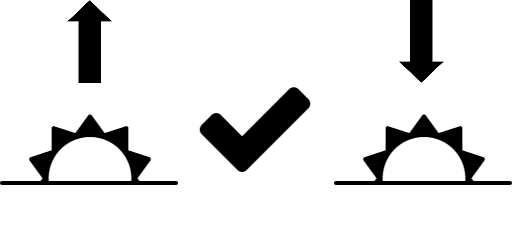Each evening sees it close;
Something attempted, something done,
Has earned a night’s repose”

What are Daily deliverables?
This means getting something … anything done every day. Even if it is just one thing.
This is commonly referred to as “eating the frog”
Why daily deliverables?
The goal is to improve productivity and morale, through a constantly re-affirmed sense of accomplishment
-
Daily deliverables improve personal morale
Most people run on morale and motivation. Each day you go home and don’t accomplish something, you drain yourself of morale a little bit more. Until finally you have none left and you are “running on empty” like a zombie 😉 People lose hope when the finish line is too far away and give up. I’ve seen it. Every accomplishment adds back to your morale and motivation and keeps your efficiency high.
Daily deliverables result in better performance feedback loop
Daily deliverables allow us to track progress. By accomplishing something every day we can see progress, or lack thereof, and help manage it. If a task is one month long with no iterative reporting, it is too easy to get “stuck” and then ultimately not complete the final task on time, only finding out about problems until it was too late. We look for “In progress” in our SCRUM daily summaries. If we see too many “In progress” and not enough “Done”, we know there is a problem.
Daily accomplishments can be “burned down” on a daily basis via a burn down graph. This provides a great visual as to whether you are on target, late, or ahead.
Daily deliverables improve Productivity
Daily deliverables keep you working until the task is done. By allowing yourself to do tomorrow what could have been done today, your productivity will degrade and over time you’ll accomplish less. This will hurt your job performance and career development. By ensuring you work until you meet your goal, your productivity will increase.
Daily deliverables minimize multi-tasking
We don’t celebrate the ability to juggle 10 tasks at once, without ever completing any. A focus on Daily Deliverables shatters the illusion of production through multi-tasking and ensures it is never validated.
Daily deliverables facilitate proper goal setting and goal alignment
If you could just get one task done today, what would that task be? Is this task truly important to the company? A focus on Daily Deliverables forces you to answer that question every day vs allowing yourself to get caught up in meaningless busywork.
Daily deliverables encourage iterative communication
By creating the potential for more iterations and reviews of work, it provides more opportunity to spot check, review quality, train and more. If every deliverable must be “approved” this provides a built in mechanism for communication, which often doesn’t happen on its own.
Daily deliverables isolate “blocking items”
When daily progress reporting is required, blocking items and other things being “waited” on can be isolated and ideally fixed/resolved early, before they result ultimately in the failure of the larger task and turn into excuses.
The difference between proactive feedback and and excuse is time
But how can I split big tasks into daily tasks?
All tasks can be split into smaller units. Try to find atomic sub-units of work and split them up into bite sized pieces. If you have to parse a file then the sub-tasks might be to get the file data attributes, select the best language/tool to parse it, create the object model of your parsing program, write a quick and dirty technical spec etc. If a sub-task is greater than one day, split it up more. SCRUM and AGILE really facilitates this by requiring backlog tasks, sub-tasks, and daily reporting
Can I do more than one task in a day?
Of course. You want to *complete* as many tasks as possible. But this is different from working on as many tasks as possible aka multi-tasking. If you can complete many tasks during a day that is great. But if you can’t, completing at least one is better than none, which happens more often than you’d think
I don’t have task work, my work is transactional in that I must make sales, drive leads, test software etc. vs completing finite tasks. How can I apply the concepts of “Daily deliverables”?
Anything can and should be converted into a daily paradigm. The best salespeople have a firm yearly sales goal – broken all the way down to a daily goal. And broken down further into things they can effect. You can’t dictate the number of sales you will make, but you can dictate the number of calls or client visits. Make a daily goal of n calls a day or x client visits.
“Hit the body and the head will fall”
Control what you can control. If you hit your daily goal, most likely sales, or other “result”, will take care of itself.
- Eating the frog: How to create a daily-deliverable sprint burn down graph in Excel - July 12, 2018
- How to create an advanced sprint burn down chart in Excel - July 10, 2018
- Sharpen your ax - July 4, 2018

